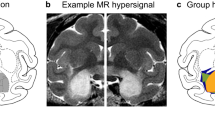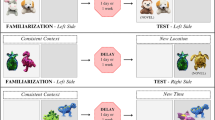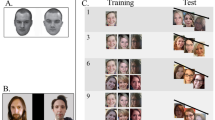Abstract
Recognition memory may be supported by two independent types of retrieval, conscious recollection of a specific experience and a sense of familiarity gained from previous exposure to particular stimuli1,2. In humans, signal detection techniques have been used to distinguish recollection and familiarity, respectively, in asymmetrical and curvilinear components of their receiver operating characteristic (ROC) curves, standard curves that represent item recognition across different levels of confidence or bias. To determine whether animals also employ multiple processes in recognition memory and to explore the anatomical basis of this distinction, we adapted these techniques to examine odour recognition memory in rats. Their ROC curve had asymmetrical and curvilinear components, indicating the existence of both recollection and familiarity in rats. Furthermore, following selective damage to the hippocampus the ROC curve became entirely symmetrical and remained curvilinear, supporting the view that the hippocampus specifically mediates the capacity for recollection.
This is a preview of subscription content, access via your institution
Access options
Subscribe to this journal
Receive 51 print issues and online access
$199.00 per year
only $3.90 per issue
Buy this article
- Purchase on Springer Link
- Instant access to full article PDF
Prices may be subject to local taxes which are calculated during checkout



Similar content being viewed by others
References
Yonelinas, A. P. The nature of recollection and familiarity: a review of 30 years of research. J. Mem. Lang. 46, 441–517 (2002)
Sherman, S. J., Atri, A., Hasselmo, M. E., Stern, C. E. & Howard, M. W. Scopolamine impairs human recognition memory: data and modeling. Behav. Neurosci. 117, 526–539 (2003)
Yonelinas, A. P. et al. Effects of extensive temporal lobe damage or mild hypoxia on recollection and familiarity. Nature Neurosci. 5, 1236–1241 (2002)
Davachi, L. & Wagner, A. D. Hippocampal contributions to episodic encoding: insights from relational and item-based learning. J. Neurophysiol. 88, 982–990 (2002)
Ranganath, C., Johnson, M. K. & D'Esposito, M. Prefrontal activity associated with working memory and episodic long-term memory. Neuropsychologia 41, 378–389 (2003)
Manns, J. R., Hopkins, R. O., Reed, J. M., Kitchener, E. G. & Squire, L. R. Recognition memory and the human hippocampus. Neuron 37, 171–180 (2003)
Stark, C. E. & Squire, L. R. Functional magnetic resonance imaging (fMRI) activity in the hippocampal region during recognition memory. J. Neurosci. 20, 7776–7781 (2000)
Eichenbaum, H., Otto, T. & Cohen, N. J. Two functional components of the hippocampal memory system. Behav. Brain Sci. 17, 449–472, 472–518 (1994)
Brown, M. W. & Aggleton, J. P. Recognition memory: what are the roles of the perirhinal cortex and hippocampus? Nature Rev. Neurosci. 2, 51–61 (2001)
Beason-Held, L. L., Rosene, D. L., Killiany, R. J. & Moss, M. B. Hippocampal formation lesions produce memory impairment in the rhesus monkey. Hippocampus 9, 562–574 (1999)
Zola, S. M. et al. Impaired recognition memory in monkeys after damage limited to the hippocampal region. J. Neurosci. 20, 451–463 (2000)
Nemanic, S., Alvarado, M. C. & Bachevalier, J. The hippocampal/parahippocampal regions and recognition memory: insights from visual paired comparison versus object-delayed nonmatching in monkeys. J. Neurosci. 24, 2013–2026 (2004)
Mumby, D. G. Perspectives on object recognition memory following hippocampal damage: lessons from studies on rats. Behav. Brain Res. 127, 159–181 (2001)
Dudchenko, P. A., Wood, E. R. & Eichenbaum, H. Neurotoxic hippocampal lesions have no effect on odor span and little effect on odor recognition memory but produce significant impairments on spatial span, recognition, and alternation. J. Neurosci. 20, 2964–2977 (2000)
Steckler, T., Drinkenburg, W. H., Sahgal, A. & Aggleton, J. P. Recognition memory in rats II. Neuroanatomical substrates. Prog. Neurobiol. 54, 313–332 (1998)
Mumby, D. G., Gaskin, S., Glenn, M. J., Schramek, T. E. & Lehmann, H. Hippocampal damage and exploratory preferences in rats: memory for objects, places, and contexts. Learn. Mem. 9, 49–57 (2002)
Eacott, M. J. & Norman, G. Integrated memory for object, place, and context in rats: a possible model of episodic-like memory? J. Neurosci. 24, 1948–1953 (2004)
Macmillan, N. A. & Creelman, C. D. Detection Theory: A User's Guide (Cambridge Univ. Press, New York, 1991)
Yonelinas, A. P., Kroll, N. E., Dobbins, I., Lazzara, M. & Knight, R. T. Recollection and familiarity deficits in amnesia: convergence of remember-know, process dissociation, and receiver operating characteristic data. Neuropsychology 12, 323–339 (1998)
Yonelinas, A. P. Components of episodic memory: the contribution of recollection and familiarity. Phil. Trans. R. Soc. Lond. B 356, 1363–1374 (2001)
Hockley, W. E. Item versus associative information: further comparison of forgetting rates. J. Exp. Psychol. Learn. Mem. Cogn. 18, 1321–1330 (1992)
Yonelinas, A. P. & Levy, B. J. Dissociating familiarity from recollection in human recognition memory: different rates of forgetting over short retention intervals. Psychon. Bull. Rev. 9, 575–582 (2002)
Murray, E. A. & Mishkin, M. Object recognition and location memory in monkeys with excitotoxic lesions of the amygdala and hippocampus. J. Neurosci. 18, 6568–6582 (1998)
Tulving, E. Episodic memory: from mind to brain. Annu. Rev. Psychol. 53, 1–25 (2002)
Bunsey, M. & Eichenbaum, H. Conservation of hippocampal memory function in rats and humans. Nature 379, 255–257 (1996)
Day, M., Langston, R. & Morris, R. G. Glutamate-receptor-mediated encoding and retrieval of paired-associate learning. Nature 424, 205–209 (2003)
Wood, E. R., Dudchenko, P. A., Robitsek, R. J. & Eichenbaum, H. Hippocampal neurons encode information about different types of memory episodes occurring in the same location. Neuron 27, 623–633 (2000)
Kesner, R. P. in Neurobiology of Comparative Cognition (eds Kesner, R. P. & Olton, D. S.) 179–203 (Lawrence Erlbaum, New Jersey, 1990)
Clark, R. E. & Squire, L. R. Classical conditioning and brain systems: the role of awareness. Science 280, 77–81 (1998)
Fortin, N. J., Agster, K. L. & Eichenbaum, H. Critical role of the hippocampus in memory for sequences of events. Nature Neurosci. 5, 458–462 (2002)
Acknowledgements
We thank J. O'Connell, A. Milewski, L. Giocomo, J. Estes, D. Tosa, R. Kline, J. Davidson and B. Goldberg for help with behavioural testing. We also thank R. Komorowski for histological work, A. Yonelinas for providing the least-squares curve-fitting algorithm and J. Manns for comments on an earlier version of this manuscript. Supported by NIA and NIMH.
Author information
Authors and Affiliations
Corresponding author
Ethics declarations
Competing interests
The authors declare that they have no competing financial interests.
Supplementary information
Supplementary Notes
Presents further notes on analyses of raw and z-tranformed data. (DOC 28 kb)
Supplementary Figure 1
Slopes of linear fits for preoperative, control, and hippocampal group data in z-ROC space. (JPG 44 kb)
Rights and permissions
About this article
Cite this article
Fortin, N., Wright, S. & Eichenbaum, H. Recollection-like memory retrieval in rats is dependent on the hippocampus. Nature 431, 188–191 (2004). https://doi.org/10.1038/nature02853
Received:
Accepted:
Issue Date:
DOI: https://doi.org/10.1038/nature02853
This article is cited by
-
The amygdala is not necessary for the familiarity aspect of recognition memory
Nature Communications (2023)
-
Hoarding titmice predominantly use Familiarity, and not Recollection, when remembering cache locations
Animal Cognition (2023)
-
Rats use strategies to make object choices in spontaneous object recognition tasks
Scientific Reports (2022)
-
Lesion of the hippocampus selectively enhances LEC’s activity during recognition memory based on familiarity
Scientific Reports (2021)
-
Episodic-like memory of rats as retrospective retrieval of incidentally encoded locations and involvement of the retrosplenial cortex
Scientific Reports (2021)
Comments
By submitting a comment you agree to abide by our Terms and Community Guidelines. If you find something abusive or that does not comply with our terms or guidelines please flag it as inappropriate.



